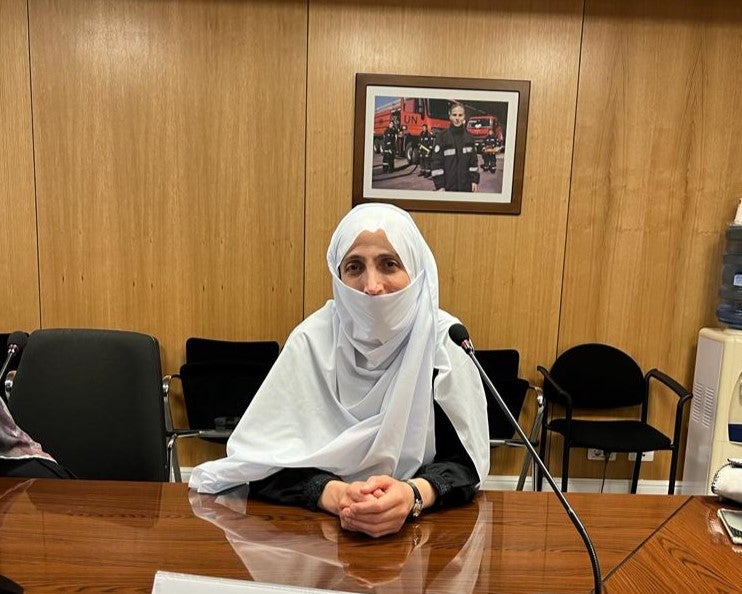In the words of Rima Al Hamra: “I see women as a source of power in mediation”
Date:
Rima Al Hamra, 50, is Director of the Hasbaya Development Services Center, which is affiliated with the Ministry of Social Affairs and is located in the South of Lebanon, where armed clashes have been witnessed along the Blue Line[1] over the past several months. She is also one of 240 local women peacebuilders who are trained to become local community mediators, as part of UN Women’s “Women, Peace and Security in the Arab States Phase III” project, which is being implemented in partnership with the Professional Mediation Centre of Saint Joseph University (CPM-USJ) and International Alert, with generous support from the Ministry of Foreign Affairs of Finland.

“While pursuing my diploma in psychology at the Lebanese University, I discovered more about the impact I can make within my community through my internships and active participation in several youth groups within the university. Moreover, my election as a student representative during the fourth year of my studies enriched my work. As a student committee, we challenged and dismantled stereotypes surrounding political affiliations within universities.
I remember when the UN Women project started, my colleague at the Ministry encouraged me to take this opportunity and to participate.
Being part of the project, the trainings[2] were the best thing I ever did in my life, and I am glad I decided to join them. These trainings helped me to change my perception towards people who have their own way of thinking, change the way I handle conflicts and to be more accepting of my surroundings. As women participating in the trainings, our relationships became stronger and trust between us became more solid.
Because of these trainings, I decided to pursue my professional diploma in mediation at the University of Saint Joseph. As my work in the Hasbaya Development Services Center requires direct interaction with diverse people, I noticed that the trainings I undertook increased my self-management skills, my control of emotions, my understanding of others, and my positive communication with them, as each person has his world map. Moreover, I noticed that I have become more accommodating and accepting of all the people I deal with.
Last year, our group of women mediators led a couple of successful initiatives as part of our project with UN Women, USJ CPM and International Alert, to build social cohesion in our communities.
We delivered a series of awareness sessions on positive communication to university students at the social development centre in Hasbaya and to women from the local community at the social development centre in Tebnin. Based on post-session feedback from the participants of both groups, we have noticed an increase in knowledge and a desire to have other sessions in the future.
We also conducted a pilot initiative testing the gender-sensitive early-warning system to prevent and respond to conflicts, disasters, and emergencies by holding focus group discussions for professors and students in Nabatiyeh Governorate and women in the region.
In light of the economic crisis that we are suffering from, the major collapse that has affected public administration and ministries, and with the outbreak of the war and the displacement of the people of the border strip, the crisis has worsened to the point that we are unable to provide support for the displaced and steadfast people. This is in addition to our financial struggles as workers. All we can do is now use our mediation skills, listen to people and provide psychological support to them as much as we can.
I see women as a source of power in mediation as their ability to be multidisciplinary helps them promote peace within local communities. Women play a huge role in mediation using their sense of humanity, empathy, and peace-making skills to make real changes in the lives of people in our community.
Mediation is a lifestyle that should be adopted to ensure long-lasting peace within our communities.”
[1] The Blue Line, stretching for 120 km along Lebanon’s southern frontier, was set by the United Nations in 2000 for the practical purpose of confirming the withdrawal of Israeli forces from the South of Lebanon.
[2] Throughout her involvement in this project, Rima has enhanced her skills in communication, conflict prevention, management and resolution and in mediation. These trainings were followed by coaching sessions, activities and initiatives on the field. Rima has also actively participated in various trainings, including those focused on gender early warning systems, gender key concepts, the memory of war, and the women, peace, and security agenda.